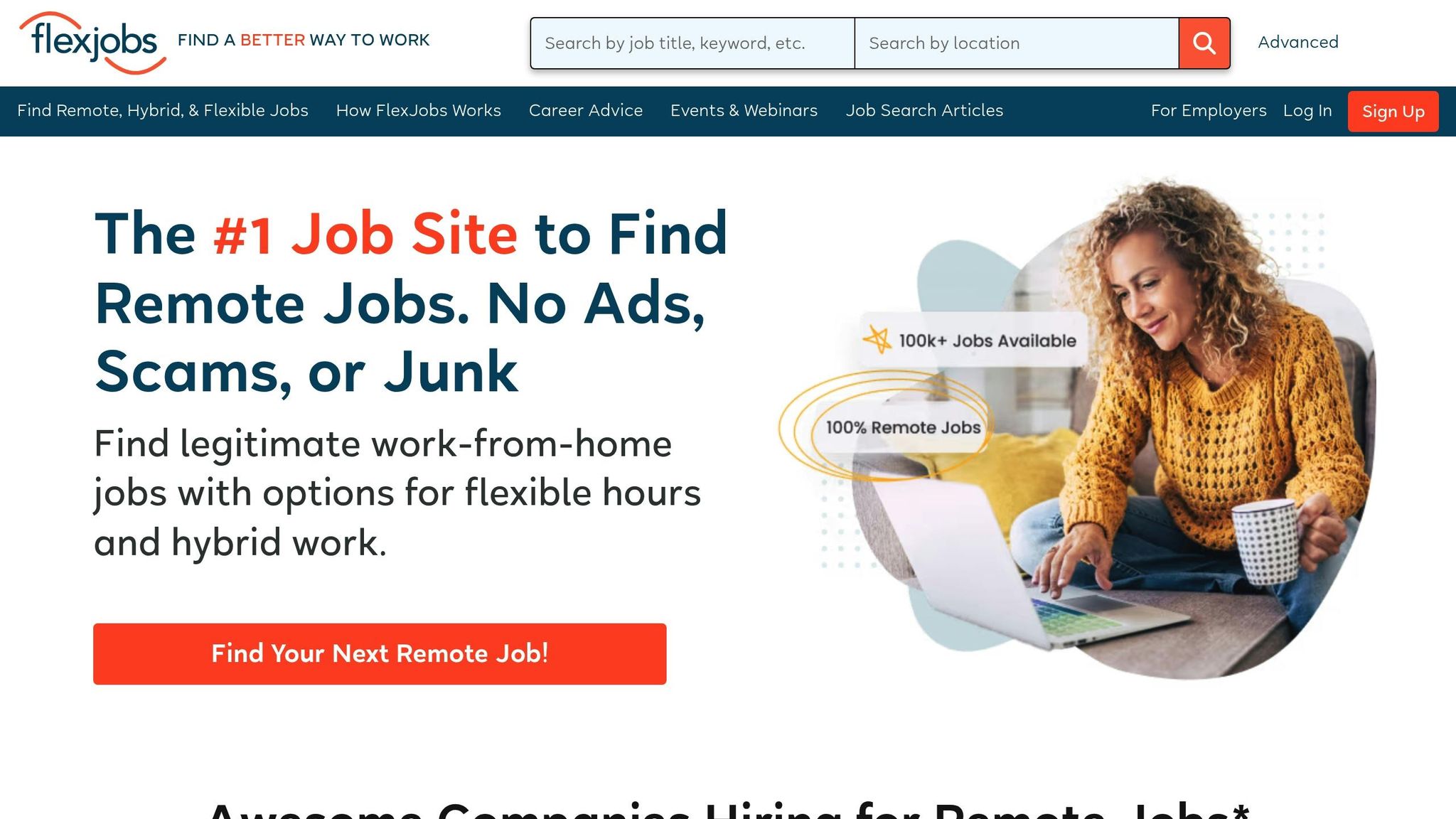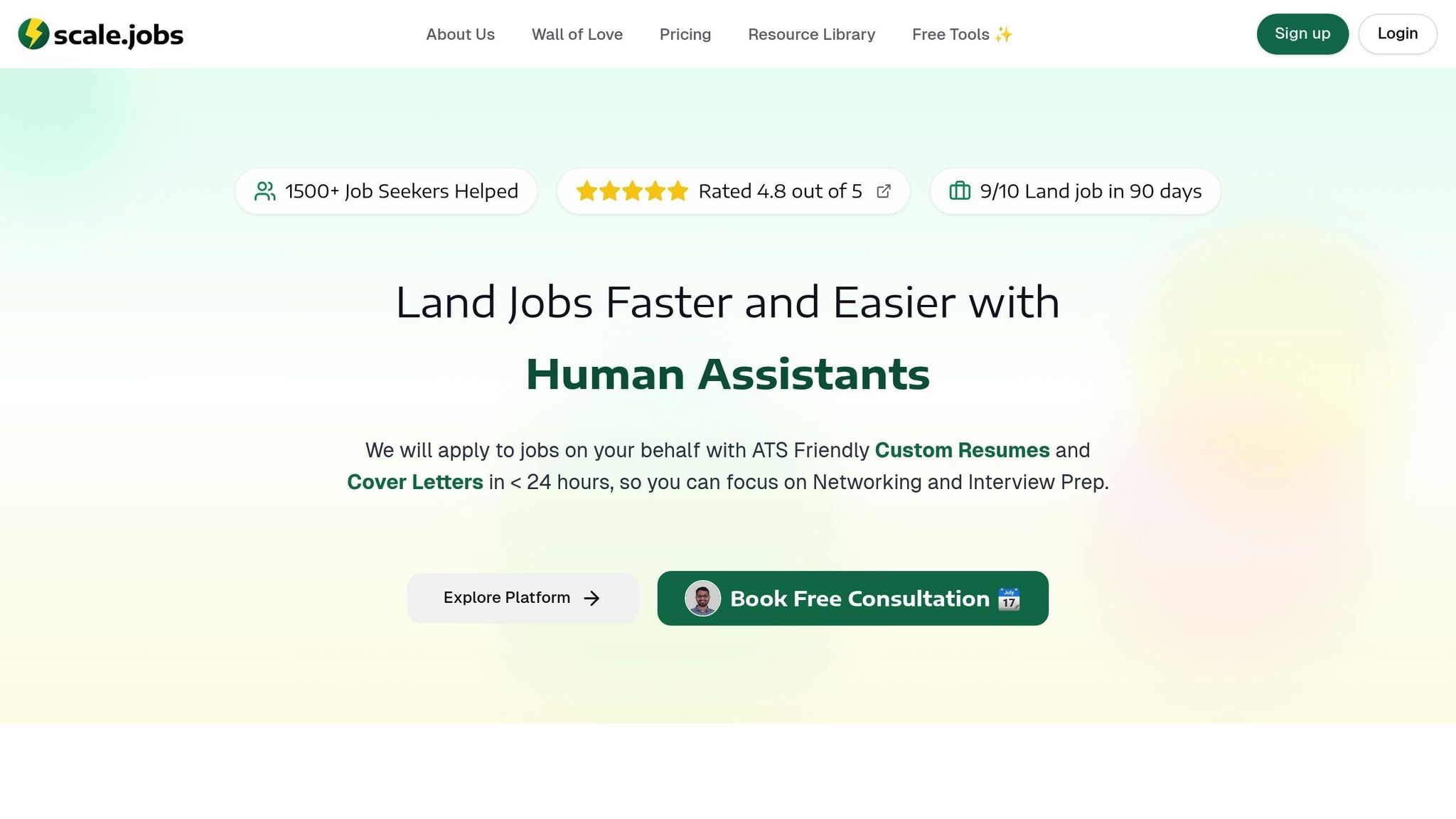How Flexible Work Policies Impact Job Seekers
Explore how flexible work policies are reshaping job seeker preferences, influencing hiring trends, and enhancing workplace satisfaction.

Flexible work policies are no longer just perks - they're now essential for many job seekers. Whether it's remote work, hybrid models, or flexible hours, these options are reshaping how people choose jobs. Here's what you need to know:
- 94% of employees benefit from flexible work, and 76% of Millennials expect it.
- Companies offering flexibility see better satisfaction, retention, and performance.
- 41% of workers prioritize flexibility over a pay raise, with 60% of applications targeting remote or hybrid roles.
- Women, Millennials, and knowledge workers value flexibility the most, while low-wage workers face limited options.
- Challenges like proximity bias and communication gaps remain, but solutions like centralized tools and clear metrics can help.
Flexible work isn't just about convenience - it's influencing hiring trends, workplace culture, and even diversity efforts. Employers ignoring this shift risk losing talent, while platforms like scale.jobs help job seekers find roles that fit their needs.
FlexJobs Review: Best Remote Job Platform? | Your Guide to Remote Work Opportunities | Competitors

How Flexible Work Policies Shape Job Seeker Choices
A growing number of job seekers are prioritizing flexibility over higher salaries. Research highlights that 41% of employees would choose flexibility over a pay increase, and nearly 60% of U.S. job applications now target hybrid or remote roles. Over 65% of workers consider the ability to work from home a key factor when evaluating job offers, while 72% prefer a hybrid model that combines remote and in-office work. Let’s dive into what’s driving this demand for flexibility.
What Drives Job Seekers to Want Flexibility
Work-life balance is the leading factor. A striking 78% of employees believe remote work improves their ability to balance personal and professional responsibilities. This shift isn’t just about convenience - 83% of employees report feeling more productive in hybrid or remote setups compared to traditional office environments.
Schedule autonomy is another major motivator. According to a survey by Future Forum, 94% of knowledge workers want control over their schedules, and 80% want the freedom to choose where they work.
"By empowering team members with flexibility, we enhance productivity and job satisfaction, which ultimately translates into better customer service." - Tony Taylor, CEO, A1 Auto
The elimination of commuting stress and costs also plays a big role. A Morning Consult survey found that 81% of respondents in the U.S. rank flexible hours and schedules as top priorities. This preference stems from practical concerns like saving time, reducing transportation expenses, and managing personal responsibilities more effectively.
Finally, enhanced productivity is a key benefit. A 2022 Gallup study found that 60% of employees in hybrid or remote roles report higher engagement levels compared to those in fully in-office positions.
These factors resonate differently across various demographic groups, revealing important trends in the demand for workplace flexibility.
Which Groups Want Flexibility Most
The desire for flexible work arrangements isn’t uniform - it varies significantly across demographics. Generational differences stand out, with 76% of Millennials, 69% of Gen Z, and 64% of Gen X expressing a preference for flexible work options. Among these groups, Millennials are the most likely to make flexibility a top priority, with 38% listing it as a critical factor in job selection.
Gender also plays a significant role. Flexibility is a top priority for 74% of women when considering job opportunities. This preference is closely tied to caregiving responsibilities, as 38% of mothers with young children report they would have had to reduce their hours or leave their jobs without flexible work options. While 74% of all workers value location flexibility, women consistently rate it as more important than men.
Knowledge workers - those in fields like tech, finance, consulting, and professional services - are another group that places a high premium on flexibility. A staggering 93% of knowledge workers want flexible hours, reflecting the nature of their work, which often doesn’t require physical presence to achieve results. Their preferences are reshaping hiring trends in industries where remote work is more feasible.
However, not all workers have equal access to flexibility. Low-wage workers, who are disproportionately women, immigrants, and people of color, are far less likely to have paid time off or flexible schedules. This creates a divide, where higher-skilled workers can demand flexibility while others remain bound by rigid work structures.
The data shows that 83% of U.S. workers value flexible working hours, but the intensity of this preference varies based on life circumstances, career stage, and industry. Companies that fail to adapt to these expectations may find it harder to attract and retain talent.
"Offering flexibility not only boosts employee satisfaction but also helps organizations attract and retain top talent in a job market where candidates prioritize work-life balance and autonomy." - Nehal Shah, Maneva Group
How Flexibility Makes Employers More Attractive
Flexible work policies have become a game-changer for companies looking to stand out. Recent research highlights that 61% of employers consider offering flexible work options essential when advertising jobs. In today’s competitive market, flexibility is more than a perk - it’s a necessity.
When job seekers weigh offers with similar pay, flexible work arrangements often tip the scales. As demand for flexibility grows, companies that adapt not only attract top talent but also build stronger, more diverse teams. Flexible policies also help with retention; only 3% of employees report leaving a job in the past year due to a lack of flexibility, proving how costly inflexibility can be.
Industries Offering the Most Flexible Work
Some industries are leading the charge when it comes to flexible work options.
- Tech and computer-related fields are at the forefront, with 77% of tech workers favoring fully remote roles. For companies in this sector, offering remote or hybrid options is almost non-negotiable.
- Education and healthcare are adapting as well. For example, 50% of education professionals in instructional and library roles report having some remote work opportunities, while 45% of healthcare practitioners and technical workers have similar options.
Even industries that traditionally required on-site work are starting to adapt. As digital transformation accelerates, sectors like manufacturing are offering flexibility for roles such as IT, engineering, and administration, while maintaining on-site requirements for production staff. Creative solutions, such as hybrid setups and compressed workweeks, are proving that flexibility can work in almost any field.
How Flexibility Improves Retention and Diversity
Flexible work arrangements don’t just make life easier for employees - they also boost productivity and loyalty. Studies show that employee engagement and productivity can increase by up to 21% when flexible options are available. This heightened engagement translates to stronger employee commitment.
Flexibility also plays a key role in advancing diversity and inclusion. By removing barriers for parents, caregivers, people with disabilities, or those in different locations, flexible policies help build teams that are not just diverse but also high-performing. In fact, inclusive teams are 17% more likely to report high performance.
The business case for diversity is equally compelling. Companies with the most ethnically diverse executive teams outperform their peers by 33% in profitability, and inclusive organizations are 1.7 times more likely to lead their markets in innovation. Plus, employees who feel a sense of belonging are 18 times more likely to stay with their employer.
"When employees feel that their organization values diversity and inclusion, they are more likely to be engaged, satisfied, and committed to their work. In turn, this leads to higher retention rates and lower turnover costs." - Gordon Loeb, Author
The key for companies is to assess which roles can accommodate flexibility and rethink job processes to support these arrangements. By doing so, employers can not only attract top talent but also build stronger, more inclusive teams that thrive in today’s evolving workplace.
Common Problems with Flexible Work Policies
While flexible work arrangements bring undeniable advantages, they’re not without their challenges. Research highlights a concerning gap in implementation: only 41% of organizations believe their hybrid work policies address key issues, and a staggering 71% of respondents feel their companies aren’t prepared to manage remote work risks. These numbers reveal a significant disconnect between intentions and execution.
Many companies dive into flexible work policies without making the necessary operational adjustments, leaving employees and managers frustrated. This rush can erode the very benefits flexibility aims to provide.
Making Flexibility Fair for All Employees
A major challenge of flexible work policies is ensuring they don’t unintentionally create inequalities among employees. Proximity bias - a tendency for managers to favor on-site workers - remains a persistent issue.
The statistics are telling: remote employees are 31% less likely to receive promotions compared to their in-office counterparts. Additionally, nearly 90% of CEOs admit they’re more inclined to assign career-advancing opportunities, raises, or promotions to those who work on-site. This creates a troubling divide, where choosing flexibility could come at the cost of career growth.
The problem becomes even more pronounced when considering different job roles. For instance, a software developer may thrive working remotely, but a warehouse supervisor has no choice but to be on-site. Such disparities can lead to feelings of inequity. To address this, organizations should:
- Centralize communication channels to ensure equal access to opportunities and information.
- Develop standardized performance metrics that evaluate outcomes rather than physical presence.
- Create flexible work models that balance accountability with collaboration.
Regular check-ins can help employees stay on track, but they need to focus on support rather than micromanagement. These fairness challenges are closely tied to broader issues like productivity and communication.
Productivity and Communication Issues
Flexible work environments often face hurdles in communication and coordination. Without the casual, spontaneous interactions of a traditional office, teams may experience delays, information silos, and struggles with alignment.
Concerns about productivity also linger. Remote employees may lack direct oversight, which can lead to increased micromanagement - ironically undermining the autonomy that makes flexible work appealing in the first place.
"Leaders at every level of an organization must understand pressing challenges regarding flexible work arrangements so that they can better communicate expectations, collaboratively solve problems, and preserve a positive and productive work culture." – MTSU Flex M.B.A.
To tackle these issues, companies should focus on fostering autonomy while maintaining clear communication. Here’s how:
- Streamline communication tools and minimize unscheduled check-ins to avoid interruptions.
- Enforce clear boundaries, like set clock-out times and limits on after-hours messaging, to prevent burnout.
- Use trial periods and measurable goals to fine-tune flexible arrangements for both employees and the organization.
Providing training programs for new employees can also help them adapt to flexible work from day one, rather than retrofitting outdated management styles. Standardizing tools and platforms across the company ensures everyone has consistent access to resources, promoting collaboration.
Finally, organizations must address the legal and compliance complexities that come with flexible work. Managing multi-jurisdictional compliance without adequate technology is a daunting task. Strong cybersecurity measures are essential to protect sensitive data, and workplace policies need to be regularly updated to reflect both flexible work practices and state-specific regulations.
How Job Platforms Help Find Flexible Work
The demand for flexible work is booming. In the U.S., 57% of wage workers now enjoy flexible schedules, and a striking 81% place high value on flexible hours. As a result, job platforms have stepped up their game, gathering remote, hybrid, and flexible roles from a variety of sources. These platforms make it simpler for job seekers to connect with opportunities that align with their lifestyle preferences.
Many of these platforms now feature advanced filters, allowing users to narrow their searches to remote, hybrid, or flexible-schedule roles. The best platforms combine the speed of AI with a personal touch, offering transparency that builds trust throughout the job search. This is especially important in a market where nearly 60% of U.S. job applications are for hybrid or remote positions, even though these jobs make up only 20% of available listings. This shift highlights the need to evaluate platforms based on their ability to meet the unique challenges of today’s flexible work environment.
Comparing Job Platforms for Flexible Work Search
When it comes to finding flexible work, not all job platforms are created equal. Let’s take a closer look at three leading platforms - scale.jobs, Simplify.jobs, and TealHQ - and how their features stack up:
| Feature | scale.jobs | Simplify.jobs | TealHQ |
|---|---|---|---|
| Flexible job filters | Advanced remote/hybrid/flexible filtering | Remote job filtering | Flexibility filters |
| AI resume/cover letter tools | Unlimited AI-tailored resumes and cover letters | AI customization | Limited AI assistance |
| Human assistant services | Full reverse recruiter services with virtual assistants | None | None |
| Application tracking | Comprehensive tracker with proof-of-work | Application tracking | Tracking features |
| Transparency features | Real-time WhatsApp updates and time-stamped screenshots | Limited status updates | Progress reporting |
| Pricing model | Free tools + $9/month AI and flat-fee human services | Free with subscription premium | Free with subscription premium |
| ATS optimization | Human-verified ATS compliance | Automated ATS checking | ATS guidance |
| Networking tools | Integrated networking features | Limited networking support | Community-focused networking |
Now, let’s dive into what makes scale.jobs stand out as the top choice for flexible job seekers.
Why scale.jobs Works Best for Job Seekers

Here’s why scale.jobs consistently outshines its competitors in helping job seekers land flexible roles:
- Personalized Application Handling: Unlike platforms that rely solely on automation, scale.jobs offers human-powered application management, ensuring tailored attention to each job submission.
- Proven Transparency and Results: A whopping 93% of users land jobs within three months. Features like real-time WhatsApp updates and time-stamped proofs of work keep users informed every step of the way.
- ATS-Optimized Resumes and Cover Letters: Scale.jobs combines AI technology with human expertise to create documents that meet Applicant Tracking System (ATS) standards - essential for navigating today’s competitive job market.
- Clear, Flat-Fee Pricing: With packages ranging from $199 for 250 applications to $1,099 for full-service options, scale.jobs eliminates recurring subscription fees, offering clear value upfront.
- More Time for Networking: By handling the heavy lifting of job applications, scale.jobs saves users over 20 hours each week - time they can dedicate to networking and interview preparation.
"We will apply to jobs on your behalf with ATS Friendly Custom Resumes and Cover Letters in < 24 hours, so you can focus on Networking and Interview Prep." - Scale.jobs
Scale.jobs addresses a crucial gap in the flexible work market. While 47% of successful job placements come directly from scale.jobs applications, another 46% stem from personal networking and individual efforts. By taking care of the application process, the platform allows job seekers to focus on building connections and preparing for interviews.
For those with specific needs, like navigating visa requirements or complex immigration statuses, scale.jobs provides specialized support. Their team of human assistants ensures applications are submitted seamlessly across a wide range of platforms, from corporate ATS systems to niche job boards. This means no opportunity is missed due to technical hurdles or unfamiliar processes.
The Future of Flexible Work and Job Searching
The way we work is undergoing a major transformation. Today, over 80% of employees consider flexibility one of their top priorities when evaluating job opportunities. This shift isn't just a passing trend - it's redefining how we approach work entirely.
Remote work has become a significant part of this change. By Q1 2025, 4 in 10 jobs are expected to be remote, and 28% of employees worldwide worked remotely in 2023, compared to 20% in 2020. In the U.S., 22.8% of employees - about 35.1 million people - worked remotely at least part-time as of August 2024. Perhaps most striking, 91% of employees globally express a preference for fully or mostly remote work, highlighting the growing demand for flexibility.
This push for flexibility is reshaping how people approach their careers. In early 2025, 29% of professionals plan to search for new roles, with the desire for greater flexibility being a key motivator. Among them, 48% are aiming for hybrid roles, while 26% prefer fully remote jobs.
Technology is driving this evolution. AI and automation are streamlining workflows, making remote teams more productive, while VR and AR technologies are on the rise, offering immersive ways for teams to collaborate. To support distributed workforces, companies are also investing in secure remote access tools and AI-powered solutions.
Flexibility isn't just about convenience - it’s also a retention tool. 76% of workers say that flexibility in when and where they work influences their decision to stay with an employer. To meet these expectations, companies are rolling out unique perks like home office stipends and wellness app subscriptions, which help attract and retain top talent.
Job platforms are also adapting to these changes. Take scale.jobs, for instance. The platform blends advanced technology with human expertise to meet the demands of modern, flexible roles. AI-driven tools match candidates to roles that align with their preferences, while the platform’s human-powered model ensures a personal touch in the hiring process. As companies adopt more complex hiring practices for flexible jobs, platforms like scale.jobs are becoming essential for connecting talent with the right opportunities.
Looking ahead, the workplace is shifting toward a decentralized model with remote work hubs designed for distributed teams. Employers are focusing on sustainable remote work practices that support well-being, while employees are encouraged to pursue reskilling and upskilling programs to stay competitive in an increasingly digital environment. Platforms like scale.jobs play a vital role in bridging the gap, helping job seekers adapt to and thrive in this new landscape.
As flexible work becomes the norm, the job search process is evolving, too. Platforms that combine cutting-edge technology with human insight - like scale.jobs’ integration of AI tools and dedicated human support - are uniquely positioned to help job seekers find roles that align with their goals and lifestyles in this ever-changing job market.
FAQs
How do flexible work policies influence employee performance and job satisfaction?
Flexible work policies can greatly boost both how well employees perform and how satisfied they feel in their roles. By giving people the freedom to better juggle their personal and professional responsibilities, these policies help cut down on stress and promote a healthier sense of well-being. When employees feel more balanced, they tend to be more focused, engaged, and productive at work.
Studies back this up, showing that flexible schedules can drive a 30% jump in both job satisfaction and productivity. On top of that, these policies can reduce absenteeism and build stronger feelings of loyalty and motivation. It's a clear win for both employees and employers alike.
What challenges do companies face when adopting flexible work policies?
Challenges of Implementing Flexible Work Policies
Introducing flexible work policies can bring its fair share of hurdles for companies. One of the biggest challenges is maintaining clear communication and smooth coordination across teams. When employees are spread out in remote or hybrid setups, it’s easy for messages to get lost, projects to stall, or misunderstandings to arise.
Another common issue is keeping track of employee performance. Without traditional in-office oversight, managers may find it tricky to monitor productivity consistently. On top of that, preserving a strong company culture becomes a challenge when face-to-face interactions are limited, making it harder to foster team spirit and shared values.
Fairness can also become a sticking point. Ensuring that flexible arrangements work equally well for everyone - whether they’re remote, in-office, or a mix - requires careful thought. And let’s not forget the technical side: reliable access to tools, robust data protection, and addressing cybersecurity risks are all critical concerns that businesses need to tackle.
Overcoming these challenges takes more than just good intentions. It demands deliberate planning and the right tools to create an environment where employees can thrive while aligning with the company’s goals.
How can job seekers find companies that truly offer flexible work options?
If you're on the hunt for companies that truly offer flexible work arrangements, start by checking out reputable platforms such as FlexJobs, Indeed, or Remote.co. These sites are known for thoroughly vetting their job listings, giving you a solid starting point.
Dig deeper by reviewing the company's official website, reading employee reviews, and looking for specific details about their remote or hybrid work policies. Transparency in these areas is often a good sign.
Be on the lookout for warning signs like unclear job descriptions, salaries that seem too good to be true, or any requests for upfront payments. Taking the time to research and verify a company's reputation can help you focus on legitimate opportunities that truly fit your needs.




